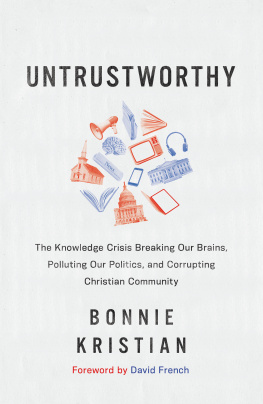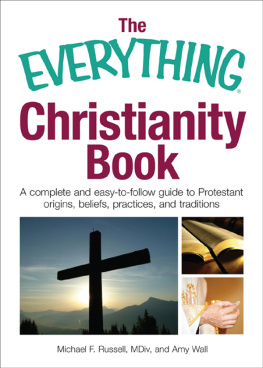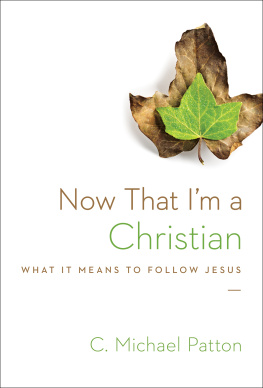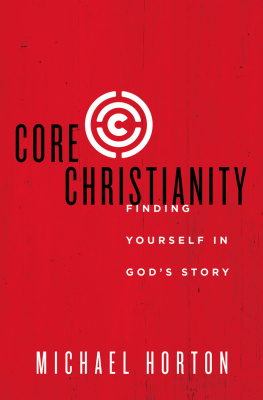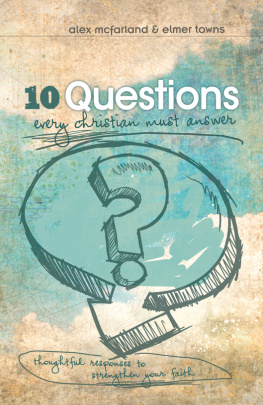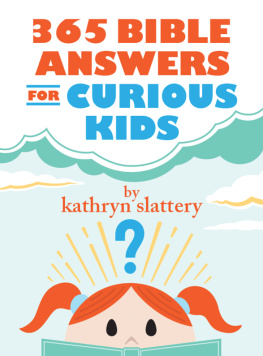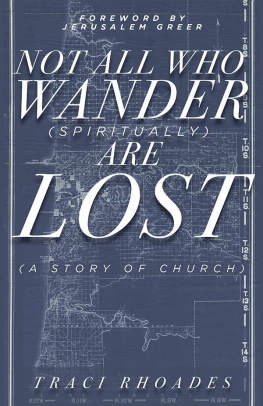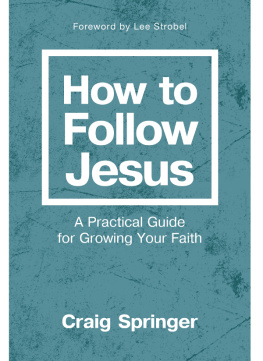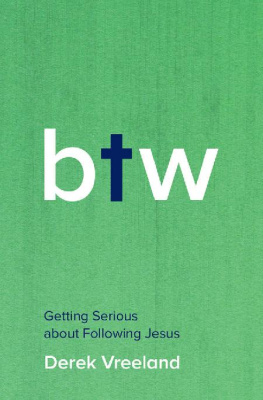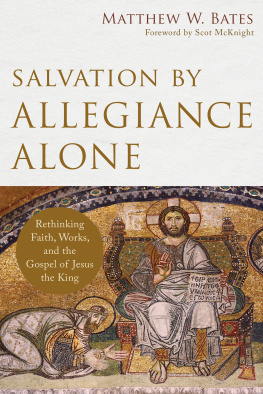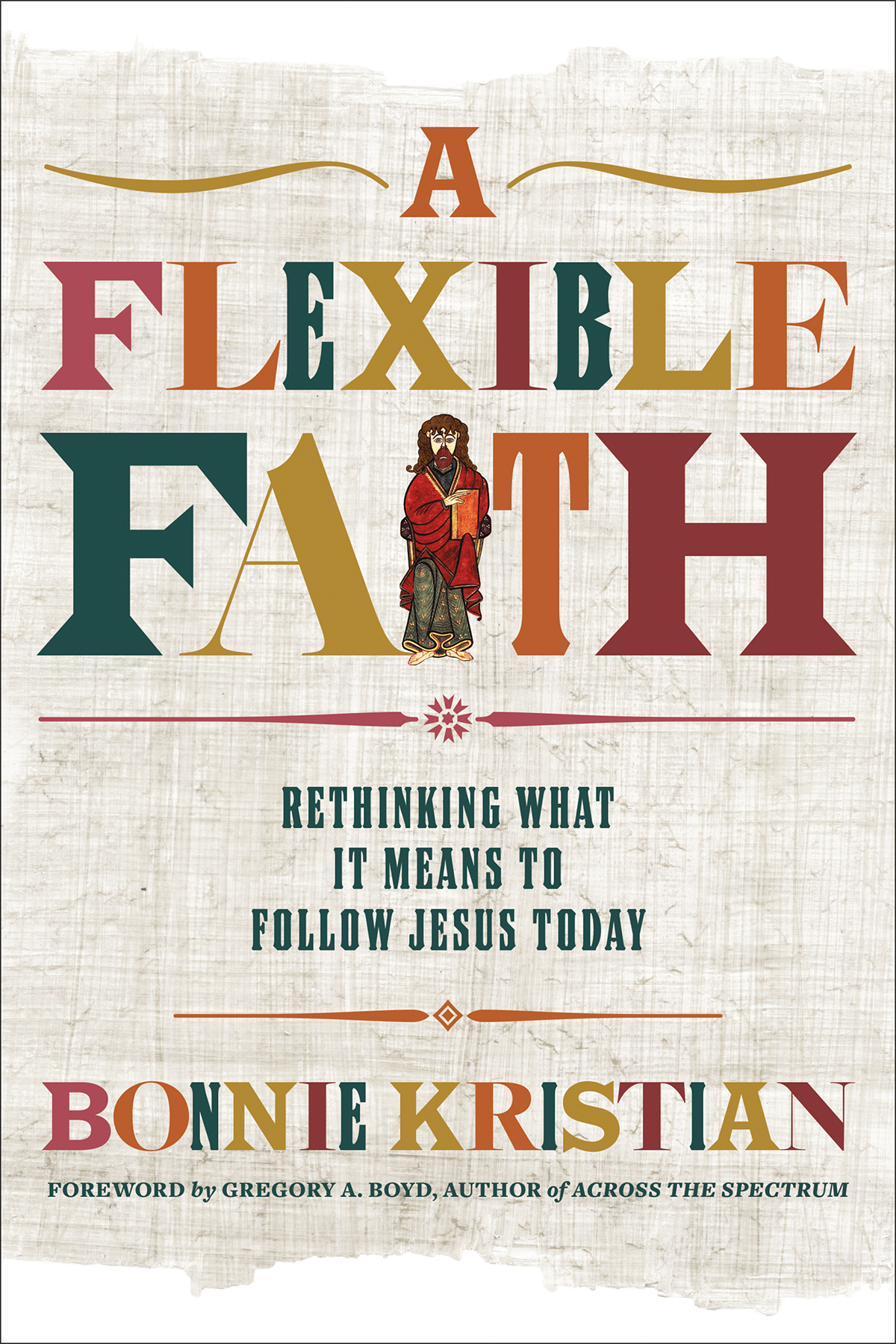Copyright 2018 by Bonnie Kristian
Foreword copyright 2018 by Gregory A. Boyd
Cover design by cover design by Edward A. Crawford. Cover photography by Superstock and Getty Images; cover art from The Book of Kells. Cover copyright 2018 by Hachette Book Group, Inc.
Hachette Book Group supports the right to free expression and the value of copyright. The purpose of copyright is to encourage writers and artists to produce the creative works that enrich our culture.
The scanning, uploading, and distribution of this book without permission is a theft of the authors intellectual property. If you would like permission to use material from the book (other than for review purposes), please contact permissions@hbgusa.com. Thank you for your support of the authors rights.
FaithWords
Hachette Book Group
1290 Avenue of the Americas, New York, NY 10104
faithwords.com
twitter.com/faithwords
First Edition: May 2018
FaithWords is a division of Hachette Book Group, Inc. The FaithWords name and logo are trademarks of Hachette Book Group, Inc.
The publisher is not responsible for websites (or their content) that are not owned by the publisher.
The Hachette Speakers Bureau provides a wide range of authors for speaking events. To find out more, go to www.hachettespeakersbureau.com or call (866) 376-6591.
All Scripture quotations, unless otherwise indicated, are taken from the Holy Bible, New International Version, NIV. Copyright 1973, 1978, 1984, 2011 by Biblica, Inc. Used by permission of Zondervan. All rights reserved worldwide. www.zondervan.com. The NIV and New International Version are trademarks registered in the United States Patent and Trademark Office by Biblica, Inc.
Scripture quotations noted ( KJV ) are taken from the King James Version of the Bible.
Scripture quotations noted ( ESV ) are from The ESV Bible (The Holy Bible, English Standard Version), copyright 2001 by Crossway, a publishing ministry of Good News Publishers. Used by permission. All rights reserved.
Library of Congress Cataloging-in-Publication Data
Names: Kristian, Bonnie, author.
Title: A flexible faith : rethinking what it means to follow Jesus today / Bonnie Kristian ; foreword by Dr. Gregory A. Boyd, author of Across the spectrum.
Description: first [edition]. | New York : Faith Words, 2018.
Identifiers: LCCN 2017054729 | ISBN 9781478992097 (trade pbk.) | ISBN 9781478992103 (ebook)
Subjects: LCSH: Christian life. | Christian sects.
Classification: LCC BV4501.3 .K76 2018 | DDC 230dc23
LC record available at https://lccn.loc.gov/2017054729
ISBNs: 978-1-4789-9209-7 (paperback), 978-1-4789-9210-3 (ebook)
E3-20181112-PDJ-PC-AMZ
To Peter, whose questions about hell started this whole thing
When I was seventeen I found Christor better, Christ found mein a radical Pentecostal church. It was a wonderful experience! The deep, meaningless void Id been experiencing up to this point in my life was replaced with an overwhelming sense of Gods love and purpose. And for me, the latter was even more life-giving than the former.
For the most part, this sense of love and purpose remained intact for about nine months. Then I enrolled at the University of Minnesota. By the end of the first semester my faith was destroyed. Though some of my former Pentecostal friends claimed I abandoned the faith to enjoy the pleasures of the world, the truth is that I absolutely hated letting go of my faith. I loved believing that life had a purpose, and returning to my former belief that life was an absurd, pointless endeavor was existentially excruciating! I desperately wanted to believe, but my brain simply wouldnt give me permission to do it.
You see, like so many other churches, the Pentecostal church I had been attending taught that a person is saved if, and only if, he or she believes the set of doctrines that specific church taught. And it was an all-or-nothing offer. I remember a sermon in which our pastor said, If evolution is true and Adam and Eve were not literal historical people, then the whole Bible is just a book of lies! That was pretty much the attitude this church had toward every one of their beliefs. So when I slowly began to be persuaded by the evidence that humans evolved (believe me, I fought it as long as I could), my belief in the Christian faith in general began to tremble. And as I said, by the end of the semester, my faith was in ruins.
Thankfully, I eventually found my way back to embracing Christ, but this unfortunately is not the case for the vast majority of people who undergo experiences like mine. And numerous studies show that such experiences are becoming so common among millennials that they are almost the norm. The core problem is that the faith that young people are taught in their churches and Christian schools is far too narrow to handle the complexities and ambiguities that characterize our pluralistic, information-intensive, postmodern world.
This rigid all-or-nothing model of faith was plausible for most people prior to the twentieth century because it was possible for them to live their entire lives without encountering people or arguments that seriously challenged their beliefs. Today, however, this model of faith is impossible for all but the most cloistered and narrow-minded to sustain. And for nonbelievers, many of whom have trouble even accepting the concept of objective truth, the idea that a particular group of people has cornered the market of truth, and that ones salvation depends on accepting this, is nothing short of comical.
The tragic irony in all this is that, as a matter of historic fact, the Christian faith has never been narrow or rigid. Yes, the orthodox Christian faith has always agreed on certain essential core doctrines such as what we find expressed in the ecumenical creeds of the Church. But when it comes to how to interpret these core doctrines, and on myriad other matters of faith and praxis, the Christian faith has always included a vast plurality of perspectives.
The trouble is, people who have been taught the all-or-nothing model of faith are usually unaware of the diversity that characterizes the historic Christian faith, or if they have any awareness of it, they are taught that everything that disagrees with their own perspective is simply wrong and need not be given serious consideration. For the sake of the credibility and livability of the Christian faith of the future, this has got to change.
This is why Bonnie Kristians A Flexible Faith is such an important and timely work. This book insightfully illustrates the pluralistic context within which all theological thinking must be carried out today. To be clear, Bonnie does not succumb to the postmodern urge to sink into complete relativism. She holds fast to the core doctrines that have defined orthodoxy throughout the ages, and she offers her own conclusions on many of the various disputes she discusses. But Bonnie arrives at these conclusions in a dialogical rather than a dogmatic way, sympathetically discussing the viable and widely divergent ways that doctrines have been understood and applied.
Also extremely helpful in broadening the perspective of readers are the wide range of historical and contemporary spokespeople whom Bonnie brings into the discussion. While some of these voices, such as Saint Augustine, are standard heroes of the faith for Western Christianity, others represent beautiful expressions of the faith that Im quite sure most readers may not yet know. How many readers will be familiar with Hildegard von Bingen, a medieval mystic and philosopher, for example, or Clare Stober, a contemporary member of a common purse Anabaptist community in New York? Yet readers will find that these voices, which lie outside the purview of most Western works of theology, greatly expand and enrich our faith when given serious consideration.


